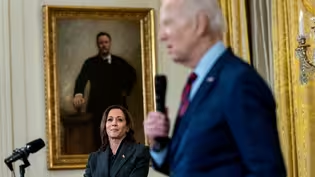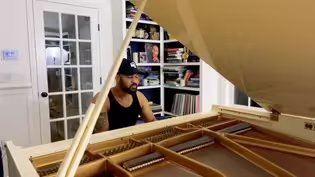
‘The Riot Report’ details civil uprisings in 1967 Detroit
Clip: Season 9 Episode 4 | 8m 15sVideo has Closed Captions
“The Riot Report” documentary, President Joe Biden drops out, BLKBOK and weekend events.
“The Riot Report” documentary examines the uprisings in the summer of 1967 by Black residents protesting police brutality, racial injustice and social and economic disparities. The documentary airs on Detroit PBS on Friday, July 26. The documentary’s co-producer and writer Jelani Cobb talks about the 57-year history of the uprisings and how they help us understand where we are as a country today
Problems playing video? | Closed Captioning Feedback
Problems playing video? | Closed Captioning Feedback
One Detroit is a local public television program presented by Detroit PBS

‘The Riot Report’ details civil uprisings in 1967 Detroit
Clip: Season 9 Episode 4 | 8m 15sVideo has Closed Captions
“The Riot Report” documentary examines the uprisings in the summer of 1967 by Black residents protesting police brutality, racial injustice and social and economic disparities. The documentary airs on Detroit PBS on Friday, July 26. The documentary’s co-producer and writer Jelani Cobb talks about the 57-year history of the uprisings and how they help us understand where we are as a country today
Problems playing video? | Closed Captioning Feedback
How to Watch One Detroit
One Detroit is available to stream on pbs.org and the free PBS App, available on iPhone, Apple TV, Android TV, Android smartphones, Amazon Fire TV, Amazon Fire Tablet, Roku, Samsung Smart TV, and Vizio.
Providing Support for PBS.org
Learn Moreabout PBS online sponsorship(tranquil ambient music) - It has been 57 years since that summer of '67, which of course we know really well here in the city of Detroit, but it wasn't just Detroit.
There were a number of cities around the country that experienced the same kind of unrest that we did here.
Let's start with why we look back at this now and what we hope to learn from looking back that far into the past to try to understand, I guess, where we are today.
- You know, I think that that's really it.
When you say trying to understand where we are today.
The fact of it is that when we look at the underlying conditions that we're associated with the onset of these disturbances, and you know, that's very different than everything that preceded it.
Sometimes, we paid attention to the explosion.
- Mm-hmm.
- But tended to overlook all the things that preceded it.
So when we look at those things holistically in context, you know, we very often see similar circumstances, we see reasons to think about the same sorts of questions.
And we have not yet arrived at a place where the kind of investigation and thoughtfulness and all the kind of inquiry that followed 1967, we've not yet reached a place where those things are no longer relevant.
- Yeah, yeah.
The conditions that lead to it, let's start kind of there unpacking.
Here in Detroit, the uprising as we call it now.
- Mm-hmm.
- It really is inspired directly by police brutality, by a disrespect, a universal disrespect for African American citizens by the police.
It also gets framed though, of course, as the result of economic conditions and the sort of overall misery that African Americans are experiencing nationwide.
But talk about how that, again, is not just about Detroit, but about where we were.
I mean, this is two years after the passing of the Voting Rights Act, this is three years after the passing of the Civil Rights Act.
And in some ways it should have been a more hopeful time for African Americans than at many times in American history, but it wasn't.
- No, because just to go back to what you mentioned, the Voting Rights Act of 1965, Watts exploded five days later.
You know, the tremendous uprisings we saw, it was largest in the country up to that point.
Just five days after the Voting Rights Act was signed.
What you saw in the 1960s was an attempt to implement programs that could generate hope at a rate that would outpace circumstances that were generating despair.
- Hmm.
- And so it is almost like you have something that catches on fire in the kitchen and you try to put it out, you try to beat out the flames and all those things before it can spread everywhere else.
And the Civil Rights acts and the reforms that you saw were an attempt to respond to something that had already reached nearly critical mass.
- Yeah.
- One of the important things about putting Detroit in context in 1967 is, you know, first on the level of the policing, you know, in Detroit, in Newark, in Watts, in Harlem, we could just kind of walk through all of those major uprisings.
They all come out of instances of police use of force, excessive use of force.
And it would be tempting to think of these as police problems.
But the fact of it is that, the inquiry and the Kerner report and the various other kind of municipal level investigations found was that the police were just the spark.
You know, the economic conditions, the disparities in health, disparities in education, the disparities in employment, the disparities in overall life possibilities, that was what was driving, the reason that the police tended to spark this was that if you have an uncaring at best, hostile at worst government, what part of that government has physical contact with you?
- Right, right.
- Well, the police do.
- Mm-hmm.
- Terrible housing is depressing, it's impacting your health and all these other kind of things.
But the people who are designating housing in these ways, you know, you don't see them and they certainly don't touch you.
This poor education, the useless system, there doesn't have generally physical contact with you.
- So it's 2024, lots of things have changed since 1967, some things haven't.
What would you want people to take away from watching this documentary now about what do we do?
How do we move forward in a way that makes sense?
- Yeah.
Not very long ago we were asking in the aftermath of George Floyd's death, we were asking the same questions that we had been asking across the country in 1967, 1968.
And it's not like these were bookends.
It's not like George Floyd's death was the first time this came up.
This could have been brought up in 1980 in Miami, where there were the uprisings that came as a result of Arthur McDuffy being killed, the motorcyclist who was beaten to death by Miami PD.
We could have had this conversation certainly in Los Angeles in 1992 when we saw the Rodney King video.
We could have had this conversation in Ferguson, and I'm skipping over very many instances.
- A lot of instances, yeah.
- All these places, lots of other episodes.
And so what we were trying to do was highlight that there had been a moment where we thought seriously about solutions and that we don't have to reinvent the wheel to say, "How do we address these things?"
They were really great, viable and important suggestions that came out of the efforts of this commission.
And the commission report was kind of orphaned at birth that the moment it was released, Lyndon B. Johnson recognized that it was politically radioactive.
- Yeah.
- That Republicans in Congress would have no part of it, that Democrats would feel squeamish about it.
And that he could feel, I mean, one thing about Johnson was that he did have an uncanny sense for the political temperature.
He could feel that it was getting colder, you know, and that all the events that culminated in the election of Nixon, or could you say it was getting hotter depending on how you think of those things, that all the things that that culminated in the election of Richard Nixon in 1968 were on the table already by the time that report came out.
One Detroit Weekend: July 26, 2024
Video has Closed Captions
Clip: S9 Ep4 | 1m 44s | Dave Wagner of 90.9 WRCJ shares some events coming up this weekend in and around Detroit. (1m 44s)
OPINION | Contributors discuss President Biden’s decision to drop out of presidential race
Video has Closed Captions
Clip: S9 Ep4 | 6m 52s | Contributors discuss President Joe Biden’s decision to drop out of the 2024 election. (6m 52s)
Piano prodigy BLKBOK bridges classical, contemporary music
Video has Closed Captions
Clip: S9 Ep4 | 4m 43s | An interview with neoclassical pianist and composer Charles Wilson III, known as BLKBOK. (4m 43s)
Providing Support for PBS.org
Learn Moreabout PBS online sponsorship
- News and Public Affairs

Top journalists deliver compelling original analysis of the hour's headlines.

- News and Public Affairs

FRONTLINE is investigative journalism that questions, explains and changes our world.












Support for PBS provided by:
One Detroit is a local public television program presented by Detroit PBS


